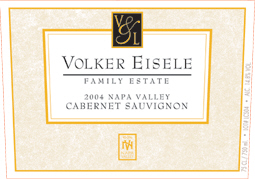

Volker Eisele Family Estate
2004 Cabernet Sauvignon(Chiles Valley ~ Napa Valley)
This entry, from one of the unheralded properties in an underappreciated region, is a fine example of what the Napa Valley can do with wines of restraint.
I was astonished, after sampling the wine, that this 2004 Cabernet from the little Volker Eisele Family Estate listed alcohol at 14.8 percent. Because nowhere in the aromas or on the palate did I detect the higher levels of alcohol that has become the average in the Valley.
The organic Chiles Valley vineyard (not to be confused with the Eisele Vineyard near Calistoga that Araujo Estate made famous), has produced a dark-red wine that reveals red fruit and herbal and mineral notes. In the mouth, it’s wonderfully balanced, obviously hiding the alcohol quite masterfully. All the right notes are here – the fruit, the oak, and the acidity are in concert.
It was aged for 22 months in 50 percent new French wood and less than 2,000 cases were produced. I like the price, too. In the end, this ’04 from the eastern hills above St. Helena is stylish without being showy. It’ll benefit with another year of age and then reward those with patience for another dozen.
Reviewed December 7, 2007 by Alan Goldfarb.
Other reviewed wines from Volker Eisele Family Estate
|
Volker Eisele Family Estate 2003 Cabernet Sauvignon (Chiles Valley ~ Napa Valley)Catherine Fallis 2/6/2007 |
|
Volker Eisele Family Estate 2002 Cabernet Sauvignon (Chiles Valley ~ Napa Valley)Alan Goldfarb 6/12/2006 |
The Wine
Winery: Volker Eisele Family Estate |
The Reviewer Alan Goldfarb
Alan Goldfarb
Alan Goldfarb has been writing about and reviewing wine for 17 years. His reviews have been published in the St. Helena Star, San Jose Mercury, San Francisco Examiner, Decanter, and Wine Enthusiast, among others. Not once has he used a point system, star system, or an iconic symbol to quantify a wine. What counts in Mr. Goldfarb’s criteria when judging a wine is: how it tastes in the glass; is it well-constructed; its food compatibility; and presence of redeeming regional attributes. |













